#Android App Scraping
Explore tagged Tumblr posts
Text
by the way Congrats IbisPaint. Somehow, you managed to piss off BOTH SIDES of the AI debate. (elaboration in tags)
#for context: ibispaint apparently added some ai scaping feature (which could be turned off thankfully!)#however they removed it after backlash#...which led to the pro-ai crowd to get angry#and just recently ibispaint added an “AI disturb” feature which prevents artists from having their data scraped#however you have to have a premium account to even turn it on#(And honestly I think they only added it as a way to say “Sowwy :C” after the initial update)#so yeah#i'd change apps but the thing is most of the other apps are either difficult to use or just straight up suck#(and a good chunk of art apps are on apple stores only- i use an android)#ibispaint#ai debate#ai discourse
2 notes
·
View notes
Text
Mobile App Scraping Services - Extract Android and IOS App Data
Gather accurate data from any iOS & Android apps using Our mobile app scraping service to make informed business decisions.
Know More : https://www.crawlxpert.com/mobile-app-scraping-services-extract-android-and-ios-app-data
#Mobile App Scraping Services#Extract Android and IOS App Data#ScrapedatafromiOSandAndroidapps#AndroidandIOSAppDataScraper
0 notes
Text
Mobile App Scraping Services | Extract Android & iOS Apps Data.
Unlock valuable insights with our Mobile App Scraping Services in the USA, UAE, UK, Canada, Spain, France, and India. Extract data from Android & iOS apps today.
know more: https://www.mobileappscraping.com/
#Mobile App Scraping Services#Android Apps Data Scraping#Scrape iOS Apps Data#Androis App Scraper#iOS App Scraper
1 note
·
View note
Text
Friday, August 11th, 2023
🌟 New
We've implemented OpenAI’s instructions for blocking GPTBot. This should discourage OpenAI, including ChatGPT, from scraping any part of Tumblr, including individual blogs.
We’re rolling out a new redesign of the direct messaging conversation view.
🛠 Fixed
The latest version of the Android app (30.8) fixes the issue where links to “View Post” on filtered posts opens the web browser instead of taking you to the post in the app itself.
On web, we’ve improved the screen reader hint for tags on posts, so it doesn’t say “Pound” or “Number” when it encounters the hashtag symbol.
Fixed an issue on web that was preventing the Related Tags section of the sidebar from showing up on the search results page.
Fixed a bug in the mobile apps for group blogs which was preventing members from editing the Notifications settings for those group blogs.
We’ve been rolling through some bug fix releases and one major release for the StreamBuilder framework.
🚧 Ongoing
Nothing to report here today.
🌱 Upcoming
We’re cooking up our first public reveal on the @labs blog, give that blog a follow if you want to see what we’re working on!
Experiencing an issue? File a Support Request and we’ll get back to you as soon as we can!
Want to share your feedback about something? Check out our Work in Progress blog and start a discussion with the community.
1K notes
·
View notes
Text
People should really consider using Tumblr mobile web instead of the app. It means your Tumblr account isn't directly beholden to app store companies, ie Apple and Google, so it hasn't experienced the automatic user settings changes to suppress mature content that ios and android users have both now experienced.
You're also taking your business away from app stores by using mobile web, especially if you pay for a tumblr subscription via an app store (I mean, idk who does lol but just saying). You'd still be using a browser app of course but you can choose which browser fits your needs & privacy level preferences (including choosing not to use Chrome), and deleting the Tumblr app is one less app downloaded, one less app scraping your personal information. It obviously doesn't impact what content is labeled as mature, but it's a drop in the bucket as far as making your Tumblr account one extra step removed from app store control.
Mobile web is the neglected stepchild of Tumblr updates, too, and that's a great thing lmao. The updates we do get are the ones that are more solid quality-of-life improvements and better tested before they get released, in my experience anyway.
Mobile web usually doesn't get all the flashy new updates right away or frequent UI changes that the apps get (I hate that kind of stuff so it's a plus for me lol), I find the UI much more straightforward and simple from my brief flings with the app, and experiences less bugginess from what I read on the @/changes official account.
So, app store is making it more difficult to access adult content? Don't use the app!
118 notes
·
View notes
Text
Updated Personal Infosec Post
Been awhile since I've had one of these posts part deus: but I figure with all that's going on in the world it's time to make another one and get some stuff out there for people. A lot of the information I'm going to go over you can find here:
https://www.privacyguides.org/en/tools/
So if you'd like to just click the link and ignore the rest of the post that's fine, I strongly recommend checking out the Privacy Guides. Browsers: There's a number to go with but for this post going forward I'm going to recommend Firefox. I know that the Privacy Guides lists Brave and Safari as possible options but Brave is Chrome based now and Safari has ties to Apple. Mullvad is also an option but that's for your more experienced users so I'll leave that up to them to work out. Browser Extensions:
uBlock Origin: content blocker that blocks ads, trackers, and fingerprinting scripts. Notable for being the only ad blocker that still works on Youtube.
Privacy Badger: Content blocker that specifically blocks trackers and fingerprinting scripts. This one will catch things that uBlock doesn't catch but does not work for ads.
Facebook Container: "but I don't have facebook" you might say. Doesn't matter, Meta/Facebook still has trackers out there in EVERYTHING and this containerizes them off away from everything else.
Bitwarden: Password vaulting software, don't trust the password saving features of your browsers, this has multiple layers of security to prevent your passwords from being stolen.
ClearURLs: Allows you to copy and paste URL's without any trackers attached to them.
VPN: Note: VPN software doesn't make you anonymous, no matter what your favorite youtuber tells you, but it does make it harder for your data to be tracked and it makes it less open for whatever public network you're presently connected to.
Mozilla VPN: If you get the annual subscription it's ~$60/year and it comes with an extension that you can install into Firefox.
Mullvad VPN: Is a fast and inexpensive VPN with a serious focus on transparency and security. They have been in operation since 2009. Mullvad is based in Sweden and offers a 30-day money-back guarantee for payment methods that allow it.
Email Provider: Note: By now you've probably realized that Gmail, Outlook, and basically all of the major "free" e-mail service providers are scraping your e-mail data to use for ad data. There are more secure services that can get you away from that but if you'd like the same storage levels you have on Gmail/Ol utlook.com you'll need to pay.
Tuta: Secure, end-to-end encrypted, been around a very long time, and offers a free option up to 1gb.
Mailbox.org: Is an email service with a focus on being secure, ad-free, and privately powered by 100% eco-friendly energy. They have been in operation since 2014. Mailbox.org is based in Berlin, Germany. Accounts start with up to 2GB storage, which can be upgraded as needed.
Email Client:
Thunderbird: a free, open-source, cross-platform email, newsgroup, news feed, and chat (XMPP, IRC, Matrix) client developed by the Thunderbird community, and previously by the Mozilla Foundation.
FairMail (Android Only): minimal, open-source email app which uses open standards (IMAP, SMTP, OpenPGP), has several out of the box privacy features, and minimizes data and battery usage.
Cloud Storage:
Tresorit: Encrypted cloud storage owned by the national postal service of Switzerland. Received MULTIPLE awards for their security stats.
Peergos: decentralized and open-source, allows for you to set up your own cloud storage, but will require a certain level of expertise.
Microsoft Office Replacements:
LibreOffice: free and open-source, updates regularly, and has the majority of the same functions as base level Microsoft Office.
OnlyOffice: cloud-based, free
FreeOffice: Personal licenses are free, probably the closest to a fully office suite replacement.
Chat Clients: Note: As you've heard SMS and even WhatsApp and some other popular chat clients are basically open season right now. These are a couple of options to replace those. Note2: Signal has had some reports of security flaws, the service it was built on was originally built for the US Government, and it is based within the CONUS thus is susceptible to US subpoenas. Take that as you will.
Signal: Provides IM and calling securely and encrypted, has multiple layers of data hardening to prevent intrusion and exfil of data.
Molly (Android OS only): Alternative client to Signal. Routes communications through the TOR Network.
Briar: Encrypted IM client that connects to other clients through the TOR Network, can also chat via wifi or bluetooth.
SimpleX: Truly anonymous account creation, fully encrypted end to end, available for Android and iOS.
Now for the last bit, I know that the majority of people are on Windows or macOS, but if you can get on Linux I would strongly recommend it. pop_OS, Ubuntu, and Mint are super easy distros to use and install. They all have very easy to follow instructions on how to install them on your PC and if you'd like to just test them out all you need is a thumb drive to boot off of to run in demo mode. For more secure distributions for the more advanced users the options are: Whonix, Tails (Live USB only), and Qubes OS.
On a personal note I use Arch Linux, but I WOULD NOT recommend this be anyone's first distro as it requires at least a base level understanding of Linux and liberal use of the Arch Linux Wiki. If you game through Steam their Proton emulator in compatibility mode works wonders, I'm presently playing a major studio game that released in 2024 with no Linux support on it and once I got my drivers installed it's looked great. There are some learning curves to get around, but the benefit of the Linux community is that there's always people out there willing to help. I hope some of this information helps you and look out for yourself, it's starting to look scarier than normal out there.

#infosec#personal information#personal infosec#info sec#firefox#mullvad#vpn#vpn service#linux#linux tails#pop_os#ubuntu#linux mint#long post#whonix#qubes os#arch linux
79 notes
·
View notes
Text
Frank Wilhoit described conservativism as “exactly one proposition”:
There must be in-groups whom the law protects but does not bind, alongside out-groups whom the law binds but does not protect.This is likewise the project of corporatism. Tech platforms are urgently committed to ensuring that they can do anything they want on their platforms — and they’re even more dedicated to the proposition that you must not do anything they don’t want on their platforms.
They can lock you in. You can’t unlock yourself. Facebook attained network-effects growth by giving its users bots that logged into Myspace on their behalf, scraped the contents of their inboxes for the messages from the friends they left behind, and plunked them in their Facebook inboxes.
Facebook then sued a company that did the same thing to Facebook, who wanted to make it as easy for Facebook users to leave Facebook as it had been to get started there.
Apple reverse-engineered Microsoft’s crown jewels — the Office file-formats that kept users locked to its operating systems — so it could clone them and let users change OSes.
Try to do that today — say, to make a runtime so you can use your iOS apps and media on an Android device or a non-Apple desktop — and Apple will reduce you to radioactive rubble.
- Let the Platforms Burn: The Opposite of Good Fires is Wildfires
#platform decay#fire debt#good fire#threads#interoperability#privacy without monopoly#fediverse#zuck's empire of oily rags#wildland–urban interface#network effects#switching costs#network effects vs switching costs#adversarial interoperability#comcom#competitive compatibility#enshittification#twiddling
866 notes
·
View notes
Text
great time for content creators right now.
ao3 gets scraped and content is stolen to train AI. So you lock all your fics and immediately interaction almost stops completely.
tumblr app on android phones flags every single gif set of mine (and others) as mature content so people using the app cannot see it / have to click twice to see it. So interaction on tumblr drops to a new low as well.
what a shitty week.
#google play store get your shit together#and tumblr get your shit together#and FUCK YOU AI#also why do I even bother anymore?!
6 notes
·
View notes
Text
Mobile App Scraping Services for iOS and Android | Maximize Your Business Potential
Unlock the full potential of your business with our Mobile App Scraping Services for iOS and Android. Harness valuable insights and data to drive growth and success.
0 notes
Text
Ch-ch-changes
🌟 Novità
Abbiamo implementato le istruzioni di OpenAI per bloccare GPTBot. Ciò dovrebbe scoraggiare OpenAI, incluso ChatGPT, dallo scraping di qualsiasi parte di Tumblr, inclusi i singoli blog.
Stiamo implementando una nuova modalità di visualizzazione della messaggistica diretta.
🛠 Correzioni
L'ultima versione dell'app per Android (30.8) risolve il problema per cui i collegamenti a "Visualizza post" sui post filtrati aprono il browser web invece di portarti al post nell'app stessa.
Sul web, abbiamo migliorato il suggerimento dello screen reader per i tag sui post, in modo che non dica "Pound" o "Numero" quando incontra il simbolo dell'hashtag.
Risolto un problema sul web che impediva la visualizzazione della sezione Tag correlati della barra laterale nella pagina dei risultati di ricerca.
Risolto un bug nelle app mobili per i blog di gruppo che impediva ai membri di modificare le impostazioni delle notifiche per quei blog di gruppo.
Abbiamo esaminato alcune versioni di correzione di bug e una versione principale per il framework StreamBuilder.
🚧 In corso
Niente da segnalare qui oggi.
🌱 In arrivo
Stiamo preparando la nostra prima rivelazione pubblica sul blog @labs, segui quel blog se vuoi vedere a cosa stiamo lavorando (solo in inglese)!
Hai riscontrato un problema? Invia una richiesta di supporto e ti risponderemo il prima possibile!
Vuoi condividere il tuo feedback su qualcosa? Dai un'occhiata al nostro blog Work in Progress e avvia una discussione con la community.
20 notes
·
View notes
Text
Well, friends, I've done it again. At 93,190 words, I've broken Google Docs for Android again, and for the first time in this file, I've had the swipe-backspace fail and glitch the hell out.
Neat.
And yeah, I know, Google Docs bad, Google Docs scraping for AI training, Google Docs can delete your files, Google Docs evil. I'm aware. I'm also 90% writing on my phone because sitting at my desk is painful sometimes due to disability and I don't have a good cloud-storage-based replacement for it, especially one that's as universally supported by other apps/programs/sites and for free. This is just the hellscape we have.
(Also like, keep regular backups anyway, y'all, you should just be doing that anyway. They can't delete a downloaded hard copy away from you. I even download backups onto my phone because it's what I got.)
7 notes
·
View notes
Text
Syncing Scrivener 3 with Mega
Because Dropbox is dumb and being very glitchy lately, the sync function is no longer reliable. I spent a day trying to figure out why it wasn't syncing only to find out this is now an issue among Android and iOS users alike. Given the piddly space Dropbox gives as well as these ongoing issues, I decided to jump ship. If have Scrivener and are thinking of doing the same, here's a lil guide for you.
I opted to go with Mega. Their free account comes with 20 GB. Their website says 20, but if you download the mobile and desktop app, you get a 5 GB bonus for each. I suspect it might not be a permanent bonus, likely for a year, but I'll check again in the summer of 2025. They are also more privacy-oriented and have no AI scraping (like Google).
This walkthrough is for Android. I'd imagine the steps are similar for iOS, but I can't say for sure.
1. Make a Mega account, go through all that registration stuff.
2. Download the mobile app. Log in.
3. Download the desktop app. Log in
4. Open File Explorer and make a folder wherever you'd like your files to be synced from.
5. Once the desktop app is installed, you need to look for the icon to open the program. I found it in my task bar. The little red M icon is what you need to open.

6. Go to the three dots and double click to open up options.

7. Go to settings.
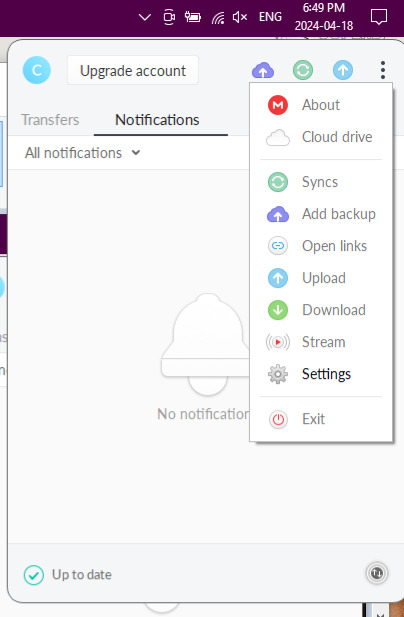
8. Go to the Sync option in the Settings menu. Select Add.

9. Another dialogue box will pop up. One the 'Local Folder' line, click 'Add'.
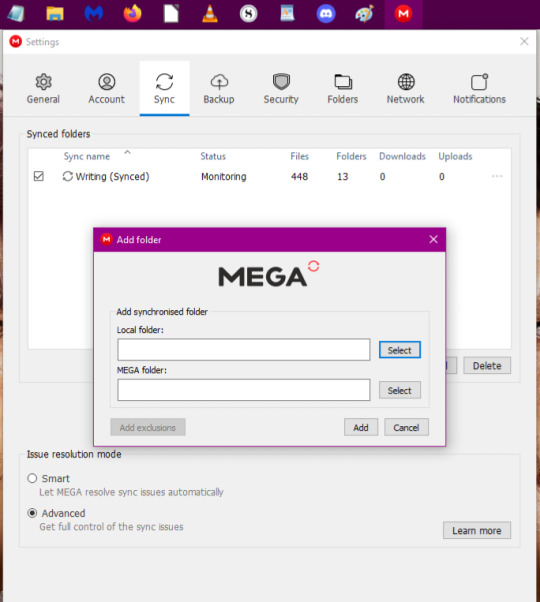
10. Select the folder you made specifically for sync. For this walkthrough, I'm using the 'Testing' folder.

11. Once you've selected your folder, you'll be back at the previous dialogue box. Now click on 'Select' on the MEGA folder line.

12. I forgot to take a screenshot, but you'll have a new dialogue box pop up with an empty list. Select the grey box saying 'New Folder'. You can name it whatever you want but I gave it the name 'Test'. Once done, your screen should look similar to the one below. Then click 'OK'.
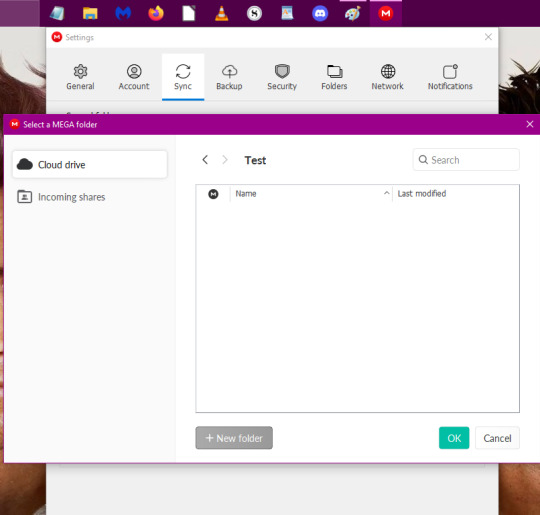
13. When done, your dialogue box should look like below. This is the crucial step as this is how the Mega program will help you sync with Scrivener. Make sure these folders are exactly where you want them to be and are named as you want. Once you're certain, click 'Add'
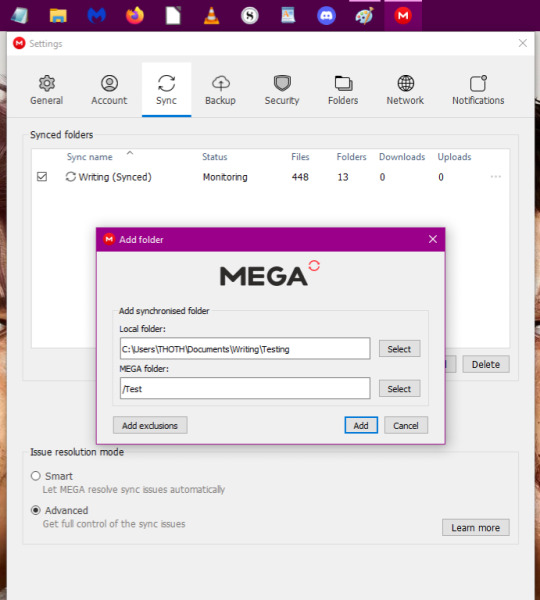
14. When done, you'll have a list that looks similar to this. The first step is done.
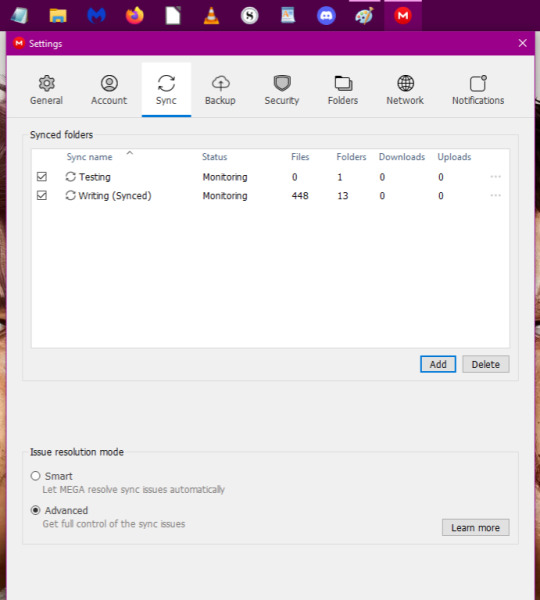
6 notes
·
View notes
Text
it seems that I started using docs back in 2016, stopped using word, and now I have way too many fics (and drafts) than I remember. i counted 150 before today, and now i found around 10-20 more? sure, i'll download it to my ssd, but in my eyes it's most likely to stay on google drive than on my ssd. (and i dislike having files i'm not using just sit there.)
plus, well, what do I do about commentaries? and when I write in docs, do I keep downloading the updated doc again and again?
back when i was searching for an alternative for docs, word didn't have a native black theme on their app for android, and it's CRUCIAL to me. not a single app aside from Docs has been able to meet my requirements so far. and I'm not even asking much:
- share it online with my beta/readers - have a native android app with a dark theme - have a decent amount of fonts to choose from (i use nunito when in docs). i tried that app for writers tumblr keeps giving me ads for (upd: it's called Ellipsus), but they have, like, 5 fonts & i disliked all of them. sorry, my brain is wired in a specific way, i can no longer write in Verdana, Arial, Sans and all of those basic ones. - the ability to easily add comments (Ellipsus has no ability to add comments) - no bugs - no ai scraping (but it seems like all of them are doing that shit these days.)
i hate it here.
4 notes
·
View notes
Text
I hate Apple I hate it so much
I have an iPad that works perfectly fine and I use it solely for drawing and, sometimes, writing on Google docs
But this iPad is getting old, and Apple is like "f u Frankie we're gonna stop sending updates to your iPad" and I'm like "that's chill can I still use it though?" And they're like "yeah" and I'm like "cool cool why isn't my Google docs app opening" and they just look at me and laugh and kick me into the mud and frame me for murder
Then they say if I want Google docs I have to buy a new iPad, and I'm here bleeding from my mouth and begging on my knees, "pleas no Mr Apple my family can't even afford groceries we barely scrape by with food stamps" and they go "lol sucks to suck"
Anyway this is my way of saying my iPad is almost fully just a brick and I love having an android phone because I will never have to buy a new one unless I break it
5 notes
·
View notes
Text
Exploring the Expansive Horizon of Selenium in Software Testing and Automation
In the dynamic and ever-transforming realm of software testing and automation, Selenium stands as an invincible powerhouse, continually evolving and expanding its horizons. Beyond being a mere tool, Selenium has matured into a comprehensive and multifaceted framework, solidifying its position as the industry's touchstone for web application testing. Its pervasive influence and indispensable role in the landscape of software quality assurance cannot be overstated.

Selenium's journey from a simple automation tool to a complex ecosystem has been nothing short of remarkable. With each new iteration and enhancement, it has consistently adapted to meet the evolving needs of software developers and testers worldwide. Its adaptability and extensibility have enabled it to stay ahead of the curve in a field where change is the only constant. In this blog, we embark on a thorough exploration of Selenium's expansive capabilities, shedding light on its multifaceted nature and its indispensable position within the constantly shifting landscape of software testing and quality assurance.
1. Web Application Testing: Selenium's claim to fame lies in its prowess in automating web testing. As web applications proliferate, the demand for skilled Selenium professionals escalates. Selenium's ability to conduct functional and regression testing makes it the preferred choice for ensuring the quality and reliability of web applications, a domain where excellence is non-negotiable.
2. Cross-Browser Testing: In a world of diverse web browsers, compatibility is paramount. Selenium's cross-browser testing capabilities are instrumental in validating that web applications perform seamlessly across Chrome, Firefox, Safari, Edge, and more. It ensures a consistent and user-friendly experience, regardless of the chosen browser.
3. Mobile Application Testing: Selenium's reach extends to mobile app testing through the integration of Appium, a mobile automation tool. This expansion widens the scope of Selenium to encompass the mobile application domain, enabling testers to automate testing across iOS and Android platforms with the same dexterity.
4. Integration with Continuous Integration (CI) and Continuous Delivery (CD): Selenium seamlessly integrates into CI/CD pipelines, a pivotal component of modern software development. Automated tests are executed automatically upon code changes, providing swift feedback to development teams and safeguarding against the introduction of defects.
5. Data-Driven Testing: Selenium empowers testers with data-driven testing capabilities. Testers can execute the same test with multiple sets of data, facilitating comprehensive assessment of application performance under various scenarios. This approach enhances test coverage and identifies potential issues more effectively.
6. Parallel Testing: The ability to run tests in parallel is a game-changer, particularly in Agile and DevOps environments where rapid feedback is paramount. Selenium's parallel testing capability accelerates the testing process, ensuring that it does not become a bottleneck in the development pipeline.
7. Web Scraping: Selenium's utility extends beyond testing; it can be harnessed for web scraping. This versatility allows users to extract data from websites for diverse purposes, including data analysis, market research, and competitive intelligence.
8. Robotic Process Automation: Selenium transcends testing and enters the realm of Robotic Process Automation (RPA). It can be employed to automate repetitive and rule-based tasks on web applications, streamlining processes, and reducing manual effort.
9. Community and Support: Selenium boasts an active and vibrant community of developers and testers. This community actively contributes to Selenium's growth, ensuring that it remains up-to-date with emerging technologies and industry trends. This collective effort further broadens Selenium's scope.
10. Career Opportunities: With the widespread adoption of Selenium in the software industry, there is a burgeoning demand for Selenium professionals. Mastery of Selenium opens doors to a plethora of career opportunities in software testing, automation, and quality assurance.
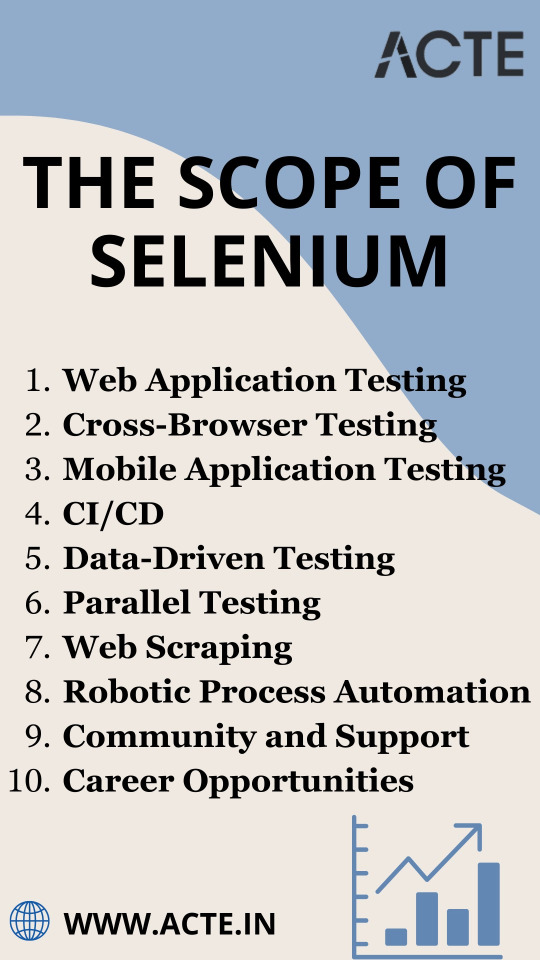
In conclusion, Selenium's scope is expansive and continuously evolving, encompassing web and mobile application testing, CI/CD integration, data-driven testing, web scraping, RPA, and more. To harness the full potential of Selenium and thrive in the dynamic field of software quality assurance, consider enrolling in training and certification programs. ACTE Technologies, a renowned institution, offers comprehensive Selenium training and certification courses. Their seasoned instructors and industry-focused curriculum are designed to equip you with the skills and knowledge needed to excel in Selenium testing and automation. Explore ACTE Technologies to elevate your Selenium skills and stay at the forefront of the software testing and automation domain, where excellence is the ultimate benchmark of success.
3 notes
·
View notes
Text
What happened to the cycle of renewal? Where are the regular, controlled burns?
Like the California settlers who subjugated the First Nations people and declared war on good fire, the finance sector conquered the tech sector.
It started in the 1980s, the era of personal computers — and Reaganomics. A new economic and legal orthodoxy took hold, one that celebrated monopolies as “efficient,” and counseled governments to nurture and protect corporations as they grew both too big to fail, and too big to jail.
For 40 years, we’ve been steadily reducing antitrust enforcement. That means a company like Google can create a single great product (a search engine) and use investors’ cash to buy a mobile stack, a video stack, an ad stack, a server-management stack, a collaboration stack, a maps and navigation stack — all while repeatedly failing to succeed with any of its in-house products.
It’s hard to appreciate just how many companies tech giants buy. Apple buys other companies more often than you buy groceries.
These giants buy out their rivals specifically to make sure you can’t leave their walled gardens. As Mark Zuckerberg says, “It is better to buy than to compete,” (which is why Zuckerberg bought Instagram, telling his CFO that it was imperative that they do the deal because Facebook users preferred Insta to FB, and were defecting in droves).
As these companies “merge to monopoly,” they are able to capture their regulators, ensuring that the law doesn’t interfere with their plans for literal world domination.
When a sector consists of just a handful of companies, it becomes cozy enough to agree on — and win — its lobbying priorities. That’s why America doesn’t have a federal privacy law. It’s why employees can be misclassified as “gig worker” contractors and denied basic labor protections.
It’s why companies can literally lock you out of your home — and your digital life — by terminating your access to your phone, your cloud, your apps, your thermostat, your door-locks, your family photos, and your tax records, with no appeal — not even the right to sue.
But regulatory capture isn’t merely about ensuring that tech companies can do whatever they want to you. Tech companies are even more concerned with criminalizing the things you want to do to them.
Frank Wilhoit described conservativism as “exactly one proposition”:
There must be in-groups whom the law protects but does not bind, alongside out-groups whom the law binds but does not protect.
This is likewise the project of corporatism. Tech platforms are urgently committed to ensuring that they can do anything they want on their platforms — and they’re even more dedicated to the proposition that you must not do anything they don’t want on their platforms.
They can lock you in. You can’t unlock yourself. Facebook attained network-effects growth by giving its users bots that logged into Myspace on their behalf, scraped the contents of their inboxes for the messages from the friends they left behind, and plunked them in their Facebook inboxes.
Facebook then sued a company that did the same thing to Facebook, who wanted to make it as easy for Facebook users to leave Facebook as it had been to get started there.
Apple reverse-engineered Microsoft’s crown jewels — the Office file-formats that kept users locked to its operating systems — so it could clone them and let users change OSes.
Try to do that today — say, to make a runtime so you can use your iOS apps and media on an Android device or a non-Apple desktop — and Apple will reduce you to radioactive rubble.
Big Tech has a million knobs on the back-end that they can endlessly twiddle to keep you locked in — and, just as importantly, they have convinced governments to ban any kind of twiddling back.
This is “felony contempt of business model.”
Governments hold back from passing and enforcing laws that limit the tech giants in the name of nurturing their “efficiency.”
But when states act to prevent new companies — or users, or co-ops, or nonprofits — from making it easier to leave the platforms, they do so in the name of protecting us.
Rather than passing a privacy law that would let them punish Meta, Apple, Google, Oracle, Microsoft and other spying companies, they ban scraping and reverse-engineering because someone might violate the privacy of the users of those platforms.
But a privacy law would control both scrapers and silos, banning tech giants from spying on their users, and banning startups and upstarts from spying on those users, too.
Rather than breaking up ad-tech, banning surveillance ads, and opening up app stores, which would make tech platforms stop stealing money from media companies through ad-fraud, price-gouging and deceptive practices, governments introduce laws requiring tech companies to share (some of) their ill-gotten profits with a few news companies.
This makes the news companies partners with the tech giants, rather than adversaries holding them to account, and makes the news into cheerleaders for massive tech profits, so long as they get their share. Rather than making it easier for the news to declare independence from Big Tech, we are fusing them forever.
We could make it easy for users to leave a tech platform where they are subject to abuse and harassment — but instead, governments pursue policies that require platforms to surveil and control their users in the name of protecting them from each other.
We could make it easy for users to leave a tech platform where their voices are algorithmically silenced, but instead we get laws requiring platforms to somehow “balance” different points of view.
The platforms aren’t merely combustible, they’re always on fire. Once you trap hundreds of millions — or billions — of people inside a walled fortress, where warlords who preside over have unlimited power over their captives, and those captives the are denied any right to liberate themselves, enshittification will surely and inevitably follow.
Laws that block us seizing the means of computation and moving away from Big Tech are like the heroic measures that governments undertake to keep people safe in the smouldering wildland-urban interface.
These measures prop up the lie that we can perfect the tech companies, so they will be suited to eternal rule.
Rather than building more fire debt, we should be making it easy for people to relocate away from the danger so we can have that long-overdue, “good fire” to burn away the rotten giants that have blotted out the sun.
What would that look like?
Well, this week’s news was all about Threads, Meta’s awful Twitter replacement devoted to “brand-safe vaporposting,” where the news and controversy are not welcome, and the experience is “like watching a Powerpoint from the Brand Research team where they tell you that Pop Tarts is crushing it on social.”
Threads may be a vacuous “Twitter alternative you would order from Brookstone,” but it commanded a lot of news, because it experienced massive growth in just hours. “Two million signups in the first two hours” and “30 million signups in the first morning.”
That growth was network-effects driven. Specifically, Meta made it possible for you to automatically carry over your list of followed Instagram accounts to Threads.
Meta was able to do this because it owns both Threads and Instagram. But Meta does not own the list of people you trust and enjoy enough to follow.
That’s yours.
Your relationships belong to you. You should be able to bring them from one service to another.
Take Mastodon. One of the most common complaints about Mastodon is that it’s hard to know whom to follow there. But as a technical matter, it’s easy: you should just follow the people you used to follow on Twitter —either because they’re on Mastodon, too, or because there’s a way to use Mastodon to read their Twitter posts.
Indeed, this is already built into Mastodon. With one click, you can export the list of everyone you follow, and everyone who follows you. Then you can switch Mastodon servers, upload that file, and automatically re-establish all those relationships.
That means that if the person who runs your server decides to shut it down, or if the server ends up being run by a maniac who hates you and delights in your torment, you don’t have to petition a public prosecutor or an elected lawmaker or a regulator to make them behave better.
You can just leave.
Meta claims that Threads will someday join the “Fediverse” (the collection of apps built on top of ActivityPub, the standard that powers Mastodon).
Rather than passing laws requiring Threads to prioritize news content, or to limit the kinds of ads the platform accepts, we could order it to turn on this Fediverse gateway and operate it such that any Threads user can leave, join any other Fediverse server, and continue to see posts from the people they follow, and who will also continue to see their posts.
youtube
Rather than devoting all our energy to keep Meta’s empire of oily rags from burning, we could devote ourselves to evacuating the burn zone.
This is the thing the platforms fear the most. They know that network effects gave them explosive growth, and they know that tech’s low switching costs will enable implosive contraction.
The thing is, network effects are a double-edged sword. People join a service to be with the people they care about. But when the people they care about start to leave, everyone rushes for the exits. Here’s danah boyd, describing the last days of Myspace:
If a central node in a network disappeared and went somewhere else (like from MySpace to Facebook), that person could pull some portion of their connections with them to a new site. However, if the accounts on the site that drew emotional intensity stopped doing so, people stopped engaging as much. Watching Friendster come undone, I started to think that the fading of emotionally sticky nodes was even more problematic than the disappearance of segments of the graph. With MySpace, I was trying to identify the point where I thought the site was going to unravel. When I started seeing the disappearance of emotionally sticky nodes, I reached out to members of the MySpace team to share my concerns and they told me that their numbers looked fine. Active uniques were high, the amount of time people spent on the site was continuing to grow, and new accounts were being created at a rate faster than accounts were being closed. I shook my head; I didn’t think that was enough. A few months later, the site started to unravel.
Tech bosses know the only thing protecting them from sudden platform collapse syndrome are the laws that have been passed to stave off the inevitable fire.
They know that platforms implode “slowly, then all at once.”
They know that if we weren’t holding each other hostage, we’d all leave in a heartbeat.
But anything that can’t go on forever will eventually stop. Suppressing good fire doesn’t mean “no fires,” it means wildfires. It’s time to declare fire debt bankruptcy. It’s time to admit we can’t make these combustible, tinder-heavy forests safe.
It’s time to start moving people out of the danger zone.
It’s time to let the platforms burn.
2 notes
·
View notes